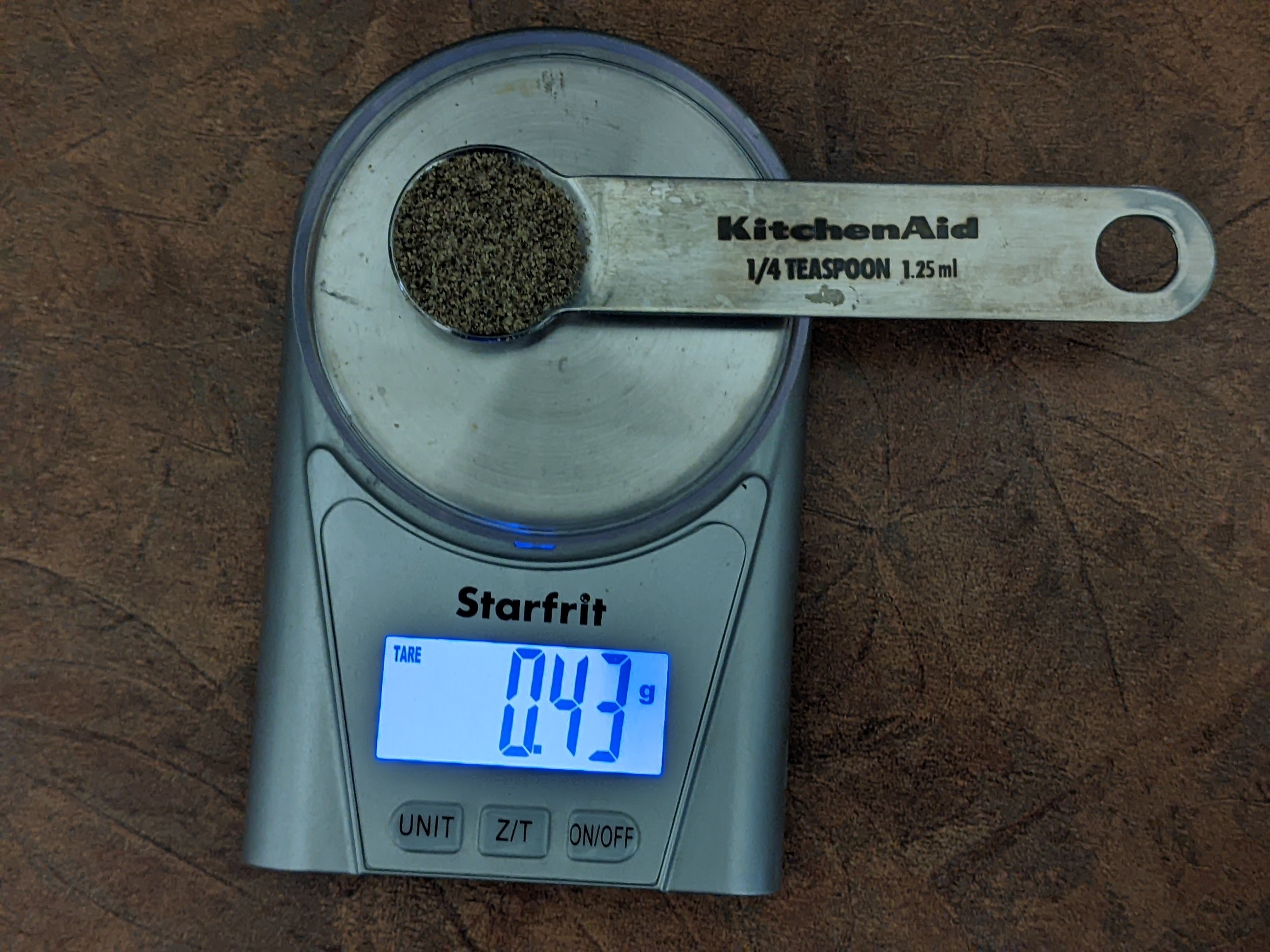I’m tired of guessing which country the author is from when they use cup measurement and how densely they put flour in it.
50g of egg
So go to Europe.
If you bake regularly then this is a popular opinion. I generally won’t bother with a recipe that does not have the weights.
But then you bake REALLY regularly, and you don’t follow recipes anymore. I know exactly what the doughs and batters look like and how they pour. I know how adding sugar and water will loosen up the batter. I know exactly how the pizza flour should ocillate between the dough hook and the walls of the bowl.
It’s like this bell curve of measuring
- 2 cups of flour
- 1oz of water
- 50g of salt
The only exception to this should be militers/liters. Because if you have to use, as example, 1l of milk, this would, if you want to be exact, be about 1.05kg
deleted by creator
What, I’m supposed to use my kitchen scale for something other than cocaine?
A cup of cocaine please.
Scale, fancy. I just keep going until the feelings disappear.
You’re doing it right. The scale is for selling not measuring doses.
i cant imagine this would be unpopular for anyone who actually bakes.
its so frustrating not having exact amounts for what is essentially chemistry.
I wanted to believe my opinion is popular yet recipes I’ve seen are almost in volume and I don’t know why.
Baking is chemistry for sure.
My total guess is weighing scales used to be expensive / inaccessible for the common home baker and one of the first popular recipe books thus used volume, became wildly popular, and indirectly taught a generation of home bakers that baking recipes are by volume, not weight.
In my opinion every recipe should be in weight unless there’s a good reason to put it in volume. The idea of washing half a dozen individual little measuring cups to prepare one recipe is absurd. Slap a bowl on your scale and go to town.
You mean a separate bowl from the main container, right? So you can remove over-scoops without disturbing the previous ingredients? I’m still trying to get comfortable with my scale. I get frustrated because there’s not parts of grams, and it doesn’t seem to constantly update, it just jumps from too little to too much.
Always 2nd bowl. Having a more sensitive scale helps with it updating faster. You can also tap the scale to try and get it to update.
I use a 0.1g/2kg scale for most things, I also have a 1g/5kg one I never use. I can’t find it rn but I also have a 0.01g/100g scale for when smartasses on the internet tell me to weigh a 1/8 tsp of pepper.
What does 1/8 tsp of pepper weigh?
Here you go. It weighs about 0.21g

That’s a small pinch of pepper. I don’t even own a measure that size.
I have a 1/8 teaspoon but the idea is… why? Anything being pinched, I’m not digging out a measuring spoon for.
Measuring by volume is definitely ridiculous. I’m an USAmerican baker.
I feel like this is just a remnant of a time where a container with a bunch of lines on it was cheaper than a sufficiently accurate scale. It might just go away over 1-2 more generations.
Anyone who gets into baking today will quickly learn volumetric measuring doesn’t work.
Basic baking you can get away with volumetric (simple breads, for example). Anything beyond that… Well, good luck.
Scales have been cheap for a couple generations now. Digital scales didn’t exist until I was an adult, but the cheap spring type did. And those were maybe $5 decades ago. It’s more about awareness and knowledge. Cookbooks 50 years ago wouldn’t have had weight measurements because people didn’t have scales.
While it’s chemistry, there is a bit of an art to it, and you can be off by a bit and still have perfectly good bread.
I can’t get my octogenarian mother to bake by weight, but she’s certainly not on Lemmy.
Black magic chemistry at that, since local, varying conditions can affect baking so much.
It’s not chemistry as much as chemistry is chemistry.
Like 1/4 cup of sugar being like 2% off isn’t going to matter.
Then you want to weigh out your teaspoon of baking powder? I guess you’ll need a small scale made for such tiny amounts to go along with your larger one. Hope you like cooking taking longer with more little things to clean.
Doing it all by weight is a waste of time and something no one with a real amount of experience cooking would bother with. Where your butter comes from is more important than how much of a weight difference can be from measuring out 3 tablespoons of it compared to weighing it out.
Hope you like cooking taking longer with more little things to clean.
You pour ingredient 1 into the bowl up to X grams. You push the tare button on the scale and pour ingredient 2 into the bowl up to Y grams. Repeat as necessary.
You end up with less shit to clean and less time wasted, not more.
Baking powder isn’t too bad for a lot of recipes, but baking soda and spices are used in such tiny amounts that my kitchen scales do not measure them accurately.
deleted by creator
It really doesn’t matter that much. When was the last time you had your kitchen scale calibrated? Are you actually putting in exactly 200g of flour? Or are you calling it good at anything between 190-210? I was a chemistry minor in college and no one was meticulously measuring out the eaxct amount or reagents they needed, they got it to the ball park and made sure to record exactly how much they used. You’re a home cook making a treat for your friends and family, not the royal pastry chef. And guess what? Those royal pastry chefs in the 18th century were also doing recipes by volume since precision scales weren’t readily available. Meanwhile i get frustrated when i run into a recipe that only uses weights because I’m not used to it. I already have incredibly limited counterspace, and find somewhere to set up my kitchen scale immediately throws me off my game.
As someone said elsewhere in this thread, you aren’t upset at volumetric measurements, you’re upset at American cultural hegemony.
bad practices become bad policies. minor issues scale terribly. its not crazy to want to do things appropriately.
as others have pointed out, scaling is far easier than washing handfuls of measuring devices. i can easily counter with your process sucks and takes more work just because you lack counterspace as opposed to dishwashing space.
just because you dont want to be exact doesnt mean others cant or shouldnt.
I’m getting high as fuck and baking treats for my friends and coworkers, not making something for a competition or dignitary. The process is irrelevant, what i was saying is that whatever you are comfortable with you should use. I can quickly scoop out 3 cups of flour and a cup and a half of sugar in the same time you can weigh them out. And at the end of the day no one will be able to tell the difference between our cookies. The temperature and humidity of your kitchen is going to have way more of an impact on your final product than a 2-5% variation in the quantity of ingredients.
when I was a chemistry minor we did things the wrong way
No wonder your opinion is wrong
Please tell me about how your universities ran their chemistry labs then, because that’s how they were at every college i attended.
I have a chemistry B.S. and Ph.D. Some reactions don’t need to go to completion or are not expected to, like organic syntheses. In other cases it’s important to get the ratio of the reactants correct, otherwise you get precursor mixed in with your product. For baking you don’t want leftover baking soda, or flour, etc.
You’re a home cook making a treat for your friends and family
And with those methods, you’ll never amount to anything more. Why improve your craft when you can be an underachiever, right?
Especially such an easy win as weighing out ingredients? It takes even less effort than counting the spoonfuls or having to sift flour into a measuring cup to prevent compacting and ruining the volumetric measurement.
Use non-American recipes.
The rest of the world does this. And guess what, 1 milliliter of water is exactly 1 gram, unlike stupid ounces.
If I want a recipe in English I always end the search query with “UK” to make sure it’s in weight, not cups. I’m not a fucking toddler
I try that too for English recipes but then I get things in tablespoons, teaspoons, pinches, good pinches, full pinches, and small bunches.
Or my favorite “a good knob of butter”
At least they aren’t using stone for flour though lol.
a millilitre of water is a gram, dog
Geez, you and the other commenter have good timing. It was a temporary edit to mess with an active commenter. Started as gram 😉
Density differs for other ingredients though.
It does, but I would still rather use grams usually. My ice cream base recipe says 500g skim milk and 470g heavy cream. I don’t have to get a measuring cup dirty—I just pour them into the bowl.
Wait, why on earth would you use skim milk in ice cream when you’re adding in basically equal parts cream anyway?
The only thing that really matters is the average milk fat %. I like Costco’s 40% heavy cream from a price and quality standpoint. My family drinks skim milk. If I mix those two equally I will end up with about 20% fat which makes a very nice ice cream.
Yeah I guess if you already have skim milk around the house then that makes sense.
1 mL water is 1 gram
Hah, that was a temporary edit to mess with the other commenter 😉 Good timing for you I guess.
That’s more an issue of its too hard for you to learn, then. Also, for cooking, that’s great that 1ml of water weighs 1mg. Why does that help with cooking? All the weights of everything else will be different from that. It’s much quicker and easier to use a measuring cups to get half a cup of flour than it is to get a scale and weigh out 60 grams.
it’s much quicker and easier
Ask any boulanger or pâtissier how to do shit baking lol
A fluid ounce of water is an ounce of weight
Except that’s not true.
An imperial fluid ounce is 1⁄20 of an imperial pint, 1⁄160 of an imperial gallon or exactly 28.4130625 mL.
A US customary fluid ounce is 1⁄16 of a US liquid pint and 1⁄128 of a US liquid gallon or exactly 29.5735295625 mL, making it about 4.08% larger than the imperial fluid ounce.
A US food labeling fluid ounce is exactly 30 mL.
So we have 28.4g, 29.6g or 30g of water. An ounce is 28.3g (closest to the imperial measures and neither of the US ones, despite the ounce being common to imperial and US systems)
I’d consider that within the margin of error for a volumetric measurement. Especially if you are being lazy like me and measuring something like milk by weight.
Funny enough, you made me go check my kitchen scales. They report in grams, ounces, and weirdly milliliters and fluid ounces. I used my scale that reports in hundredths of a gram to measure out exactly 1 oz mass. I then placed it on my other three scales to see what it would read. 2 of them correctly reported that they weren’t quite at 1 fluid ounce, while the other said it was. I never actually put my scales in ounce mode, though.
one fluid ounce of water is one (weight) ounce of water
Not exactly true. See other comments.
Downvoted for popular opinion.
Just because no one in your life cares enough about your niche opinion to actually have an opinion does not make that an “unpopular opinion.” When your opinion is the opinion of hobbyists, professionals, and elites alike, it’s certain not unpopular, even if it is niche.
You’re certainly right in your opinion, and that’s the point of bitching at you.
OP is probably from Western Europe, where a kitchen scale is common. Ain’t nobody in the US got a fancy kitchen scale.
The solution to their problem is use mL for volume.
Ain’t nobody in the US got a fancy kitchen scale.
Lots of us have them. (Well, basic scales which weigh a tenth of a gram.) They’re useful when weighing compressible dry ingredients like flour and brown sugar, and viscous wet ingredients like molasses and corn syrup. They’re also helpful when you’re multiplying a recipe by a factor that doesn’t result in useful units; it’s annoying to figure out how to measure out fractional cups that involve teaspoons.
They also help with portion control if you’re watching calories.
I have had two different well-recommended scales for baking and neither does a good job measuring 1-3 grams of ingredients. Maybe I just need to spend hundreds of dollars I don’t have on some pampered chef thing….
I do have what we call the “drug scale” in our house. It can measure to 0.01g but its capacity is so low it is useless for baking. I don’t want to weigh my baking soda badly enough to get it out.
I use this one, it’s affordable and it does a good job.
That is so cool!
“coffee scales” are good for gram scale quantities
I have one like that that goes up to 400g I think. I tried using it for measuring my creatine powder once but it wasn’t sensitive enough. Trying to cook with it seems like it would be a pain in the ass unless I was making huge batches of stuff.
Sounds to me like you just have a bad scale?
I have a pretty good scale, but it doesn’t register below 2.5g. You either need a different kind of scale for that sort of thing, or spend a lot of money on a lab-grade scale that can do both light and (relatively) heavy.
It can do tenths of grams. That seems pretty good to me. Just seems like it’s more trouble than it’s worth to do small amounts like that by weight anyway.
Technically oils and milk are lighter per volume than water so the mL to g conversion doesn’t really work. mL only equals g of water, specifically.
I wasn’t thinking about conversations, only picking a standard. A mL is a mL no matter where you are in the word.
deleted by creator
This isn’t unpopular.
Anyone who learns to bake quickly learns this.
Anyone who learns to bake knows that’s silly. You don’t need to try and weigh out a teaspoon of vanilla or that 1/4 cup of sugar weighs exactly X amount.
You don’t need to measure spoons yes, but I’d rather not dirty a cup, a bowl, a teaspoon and a tablespoon. I’d rather dirty one bowl and zero the weight every time I’m pouring something in.
Like your kitchen scale is accurate enough to weigh out a teaspoons worth of baking powder accurately.
Cleanup is so much easier also. I don’t have to use a measuring spoon or cup for ingredients—I just dispense them into the bowl until I hit the correct number.
Overshoot? Then what, scrape the flour out from the sugar?
I have done this many times. But I also got better at not overshooting.
You weigh ingredients in one bowl and pour into your mixing bowl. You still end up washing less
Fair enough
I use 25 lbs bags of flour but I’m sure I could manage.
I am a proficient baker and I can get behind this.
Flour’s ability to absorb water changes depending on what variety of wheat and where it was grown and what the weather was like during the season. Weight is also just a guideline. Baking is not an exact science.
Pretty sure any pastry chef will strongly disagree with that. If anything, baking is the cooking activity most akin to an exact science. The amounts need to be carefully measured, the temperatures need to be exactly right (e.g. Italian merengue), the baking time needs to be correct to the second for some dishes (lava cake).
Yes, the measures can change based on the flour or its substitutes (ground pistachio for example), but the processes involved require an equal amount of precision.
A lot of chefs call cooking an art, but baking a science.
I am a former pastry chef and baker. You’d think it’s very precise work but it’s actually mostly intuition based on experience. You know the recipes and tweak them as you go. Also the batch sizes are many times bigger than a home cook ever makes so a cup of flour more or less usually makes no difference to the end product. With leavening agents the margin of error is smaller obviously.
This whole thread is pretty triggering to me. People think that if the recipe is exact enough, it’ll come out perfect the first time and they won’t have to make any tweaks sure to their ingredients, their equipment, or the environment.
There’s a reason why I generally won’t make a recipe for the first time for guests.
Lol. Dude, you’re laughably wrong about this. Omg, I could just imagine trying to get lava cake out to the second or it being no good. Not even talking about how much temp, elevation, and humidity effect things to make “perfect recipes” non existent.
Also, “oh no. Your nutmeg is now 6 weeks old. You’ll have to add an extra 0.9% of it to your recipe”
Cupcakes aren’t like making Walter Whites blue meth, Hun.
And weather/storage. If flour is stored in a humid environment in a paper bag (like on a store shelf), it will get heavier as it takes on water. This messes up the weight of flour but also throws off the amount of water in the dough.
That said I prefer baking by weight, not because it’s more precise, but because I don’t dirty dishes for measurements.
I am currently pursuing engineering PhD working on bakery products.
Sometimes baking is indeed an exact science :D
It’s just that the typical home baker has to guess and assume a lot of things. But then, a chance of failure is naturally expected.
In the industrial realm, baking is quite scientific, I’m sure. It’s a much more controlled, and measureable environment than a home baker’s.
Take our ovens (please!) - you want 450? OK, how about I give you 420 to 475 as I cycle on and off? Lol
Even in the industrial realm you’ll deal with the variability in your ingredients (e.g. moisture content of flour), but you’ll have the capability to measure that, and have systems to compensate for it automatically. (Yes, I’m jealous!)
Hehe, yes, we have those and even more, because while industry can still afford some slack (but can measure moisture, humidity while proofing, precise temperature, air contamination etc.), we scientists cannot :D
We have industrial-scale ovens and proofing chambers that cycle in the range of ±5 degrees and can control humidity through steam injection, professional-grade planetary mixers and big stationary 100+kg dough mixers, automatic devices to measure moisture content (although compensating for it goes manually), devices to measure gluten deformation, sugar content on all phases, structural properties of dough and finished product, microbial contamination of flour, dough and products, leavening activity of yeast and gas retention of dough, also рН meters and automatic titrators, chromatographs, colorimeters, ultra-precise scales…and that’s only what directly relates to the baking process :D
…although yep, very regular baking takes a while under those circumstances
Baking is not an exact science

It’s not, you will be blown away at how much you can wing it and still make a delicious cake or cookies.
If you know the factors that affect the flour, you can control said factors, thus predict your results based on such factors, more or less a measurable margin of error. Ergo, baking is precisely an exact science.
How would you find out those factors about wheat?
Random sampling flour batches. And you’d think I’m joking. But no, this is exactly how we invented cookies. Cookies were baker’s experimental tool to test their flour and, by ovserving the cookie, predict what they needed to change in their bread recipes to produce the exact result they wanted.
Did you make that up yourself, or did someone else actually get you to fall for that? Testing bread flour has nothing to do with the creation of the cookie.
The story might be apocryphal, but bakers indeed do use cookies to test proportions of ingredients. You’re not going to waste a whole pound of flour just to see the effect of more or less butter in a particular recipe. You do a little bit and bake them in cookie proportions. Specially when you have to make several hundred pounds of cake at a time, you can’t afford to err on the measurements, and you do need to know variations in the flour.
Dude, you’re so wrong about all of this. Bakers typically use the same ingredients from the same providers. So they know what to expect.
And when it comes to a dough or batter, a baker can tell by look and feel if the proportions are off and will adjust accordingly.
IMO anything sold by weight should be measured by weight in a recipe.
I could have an exception for things under 20g, which scales seem to get wrong a lot. I can do spoons, but not cups.
Also: Metric only. A tablespoon is anywhere from 13g to 20g depending on who you’re talking to. A gram is always a gram.
Volume and weight are different, a tablespoon of salt, oil, and vanilla extract are all going to weigh differently.
















